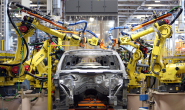Analysis

April 18, 2022
Toyota Cuts April Production on Chip, Parts Shortage
Written by David Schollaert
Toyota North America has slashed its April production by an estimated 47,000 vehicles, with more reductions in May still possible due to the prolonged global microchip and parts shortage, a company spokesperson told Steel Market Update (SMU).
![]() “Toyota’s North American plants continue to face intermittent production delays due to supply chain disruptions,” she said. “We estimate a reduction of approximately 47,000 vehicles in April.”
“Toyota’s North American plants continue to face intermittent production delays due to supply chain disruptions,” she said. “We estimate a reduction of approximately 47,000 vehicles in April.”
The North American subsidiary of Japanese-based Toyota Motor Corp. said that although they continue to diligently work to minimize the impact of the semiconductor shortage, the state of the supply chain remains fluid, possibly impacting May’s production outlook in North America.
Toyota’s spokeswoman would not specify which plants or models would be impacted, noting that those dynamics are ever-changing due to the fluid nature of the microchip and parts allocation.
With the latest round of production cuts, the Plano, Texas-based automaker has slashed roughly a total of 157,000 vehicles in 2022 – including April’s reductions – due to the lack of chip and parts readiness.
General Motors said its Fort Wayne, Ind., assembly plant will resume full production on Tuesday, April 19. The facility had been down since April 4 due to a semiconductor shortage.
“We can confirm that Ft. Wayne Assembly (Indiana) will resume full production on Tuesday, April 19,” the company spokeswoman said.
The two-week downtime disrupted part of the Detroit-based automaker’s highly profitable Chevy Silverado and GMC Sierra production, the company’s first chip-related disruption since Nov. 11 of last year.
Stellantis, the European parent company of Auburn Hills, Mich.-based Chrysler, said all North American assemblies would be running normal production schedules during the week of April 18, except for its Jefferson North Assembly Plant in Detroit.
The stoppage at Jefferson North – which began on April 4 – is part of a $900 million investment to retool and modernize the plant for continued production of the Dodge Durango SUV and the next-generation Jeep Grand Cherokee.
The downtime will run for eight weeks, with production expected to resume in late May.
Honda’s North American operations also adjusted production during the week of April 18. Though the company would not provide details to SMU on specific facilities or models, the automaker’s spokesperson said the shifts were based on parts supply availability.
Ford, Nissan, Daimler, and Subaru all reported steady production.
By David Schollaert, David@SteelMarketUpdate.com






